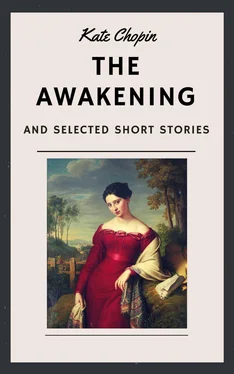“Par exemple! I never had to ask. You were always there under my feet, like a troublesome cat.”
“You mean like an adoring dog. And just as soon as Ratignolle appeared on the scene, then it WAS like a dog. 'Passez! Adieu! Allez vous-en!'”
“Perhaps I feared to make Alphonse jealous,” she interjoined, with excessive naivete. That made them all laugh. The right hand jealous of the left! The heart jealous of the soul! But for that matter, the Creole husband is never jealous; with him the gangrene passion is one which has become dwarfed by disuse.
Meanwhile Robert, addressing Mrs Pontellier, continued to tell of his one time hopeless passion for Madame Ratignolle; of sleepless nights, of consuming flames till the very sea sizzled when he took his daily plunge. While the lady at the needle kept up a little running, contemptuous comment:
“Blagueur—farceur—gros bete, va!”
He never assumed this seriocomic tone when alone with Mrs. Pontellier. She never knew precisely what to make of it; at that moment it was impossible for her to guess how much of it was jest and what proportion was earnest. It was understood that he had often spoken words of love to Madame Ratignolle, without any thought of being taken seriously. Mrs. Pontellier was glad he had not assumed a similar role toward herself. It would have been unacceptable and annoying.
Mrs. Pontellier had brought her sketching materials, which she sometimes dabbled with in an unprofessional way. She liked the dabbling. She felt in it satisfaction of a kind which no other employment afforded her.
She had long wished to try herself on Madame Ratignolle. Never had that lady seemed a more tempting subject than at that moment, seated there like some sensuous Madonna, with the gleam of the fading day enriching her splendid color.
Robert crossed over and seated himself upon the step below Mrs. Pontellier, that he might watch her work. She handled her brushes with a certain ease and freedom which came, not from long and close acquaintance with them, but from a natural aptitude. Robert followed her work with close attention, giving forth little ejaculatory expressions of appreciation in French, which he addressed to Madame Ratignolle.
“Mais ce n'est pas mal! Elle s'y connait, elle a de la force, oui.”
During his oblivious attention he once quietly rested his head against Mrs. Pontellier's arm. As gently she repulsed him. Once again he repeated the offense. She could not but believe it to be thoughtlessness on his part; yet that was no reason she should submit to it. She did not remonstrate, except again to repulse him quietly but firmly. He offered no apology. The picture completed bore no resemblance to Madame Ratignolle. She was greatly disappointed to find that it did not look like her. But it was a fair enough piece of work, and in many respects satisfying.
Mrs. Pontellier evidently did not think so. After surveying the sketch critically she drew a broad smudge of paint across its surface, and crumpled the paper between her hands.
The youngsters came tumbling up the steps, the quadroon following at the respectful distance which they required her to observe. Mrs. Pontellier made them carry her paints and things into the house. She sought to detain them for a little talk and some pleasantry. But they were greatly in earnest. They had only come to investigate the contents of the bonbon box. They accepted without murmuring what she chose to give them, each holding out two chubby hands scoop-like, in the vain hope that they might be filled; and then away they went.
The sun was low in the west, and the breeze soft and languorous that came up from the south, charged with the seductive odor of the sea. Children freshly befurbelowed, were gathering for their games under the oaks. Their voices were high and penetrating.
Madame Ratignolle folded her sewing, placing thimble, scissors, and thread all neatly together in the roll, which she pinned securely. She complained of faintness. Mrs. Pontellier flew for the cologne water and a fan. She bathed Madame Ratignolle's face with cologne, while Robert plied the fan with unnecessary vigor.
The spell was soon over, and Mrs. Pontellier could not help wondering if there were not a little imagination responsible for its origin, for the rose tint had never faded from her friend's face.
She stood watching the fair woman walk down the long line of galleries with the grace and majesty which queens are sometimes supposed to possess. Her little ones ran to meet her. Two of them clung about her white skirts, the third she took from its nurse and with a thousand endearments bore it along in her own fond, encircling arms. Though, as everybody well knew, the doctor had forbidden her to lift so much as a pin!
“Are you going bathing?” asked Robert of Mrs. Pontellier. It was not so much a question as a reminder.
“Oh, no,” she answered, with a tone of indecision. “I'm tired; I think not.” Her glance wandered from his face away toward the Gulf, whose sonorous murmur reached her like a loving but imperative entreaty.
“Oh, come!” he insisted. “You mustn't miss your bath. Come on. The water must be delicious; it will not hurt you. Come.”
He reached up for her big, rough straw hat that hung on a peg outside the door, and put it on her head. They descended the steps, and walked away together toward the beach. The sun was low in the west and the breeze was soft and warm.
Edna Pontellier could not have told why, wishing to go to the beach with Robert, she should in the first place have declined, and in the second place have followed in obedience to one of the two contradictory impulses which impelled her.
A certain light was beginning to dawn dimly within her,—the light which, showing the way, forbids it.
At that early period it served but to bewilder her. It moved her to dreams, to thoughtfulness, to the shadowy anguish which had overcome her the midnight when she had abandoned herself to tears.
In short, Mrs. Pontellier was beginning to realize her position in the universe as a human being, and to recognize her relations as an individual to the world within and about her. This may seem like a ponderous weight of wisdom to descend upon the soul of a young woman of twenty-eight—perhaps more wisdom than the Holy Ghost is usually pleased to vouchsafe to any woman.
But the beginning of things, of a world especially, is necessarily vague, tangled, chaotic, and exceedingly disturbing. How few of us ever emerge from such beginning! How many souls perish in its tumult!
The voice of the sea is seductive; never ceasing, whispering, clamoring, murmuring, inviting the soul to wander for a spell in abysses of solitude; to lose itself in mazes of inward contemplation.
The voice of the sea speaks to the soul. The touch of the sea is sensuous, enfolding the body in its soft, close embrace.
Mrs. Pontellier was not a woman given to confidences, a characteristic hitherto contrary to her nature. Even as a child she had lived her own small life all within herself. At a very early period she had apprehended instinctively the dual life—that outward existence which conforms, the inward life which questions.
That summer at Grand Isle she began to loosen a little the mantle of reserve that had always enveloped her. There may have been—there must have been—influences, both subtle and apparent, working in their several ways to induce her to do this; but the most obvious was the influence of Adele Ratignolle. The excessive physical charm of the Creole had first attracted her, for Edna had a sensuous susceptibility to beauty. Then the candor of the woman's whole existence, which every one might read, and which formed so striking a contrast to her own habitual reserve—this might have furnished a link. Who can tell what metals the gods use in forging the subtle bond which we call sympathy, which we might as well call love.
Читать дальше












